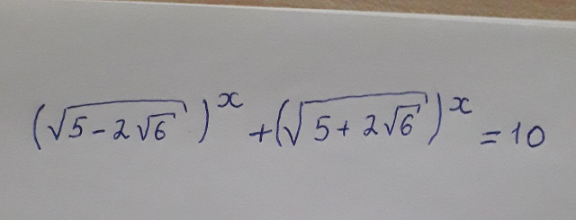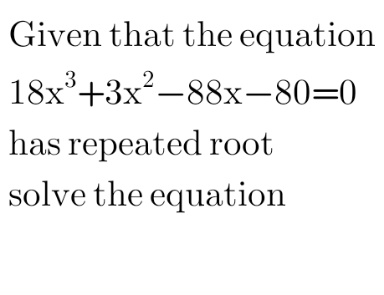
Question and Answers Forum
AlgebraQuestion and Answers: Page 222









Pg 217 Pg 218 Pg 219 Pg 220 Pg 221 Pg 222 Pg 223 Pg 224 Pg 225 Pg 226
|
Question and Answers Forum |
AlgebraQuestion and Answers: Page 222 |

|

|
| Given { ((x^(ln x+ln y) = 5)),((y^(ln x+ln y) = 2)) :} then { ((x=?)),((y=?)) :} |
| we are in C^3 . (S): { ((x+y+z=2i−1 and xyz=2)),((xy+yz+xz=−2(1+i) )) :} P(z)=z^3 +(1−2i)z^2 −2(1+i)−2. show that (a,b,c) is solution of (S) if and only a;b;c are roots of P. |
| we define in base x the number y and z by: y=123^(−) ^(x ) and z=201^(−) ^x 1) without knowing x, write the product x×y×z in function of x. 2) we suppose that x+y+z=92 find x;y;z. |
| show that if 5^(3n) +5^(2n) +5^n +1 is divisible by 13, then n (∈ N) is not a multiple of 4. |
| By divising an integer a by integer b we find the result: 0.285714285714... followed by a group of 6 digits: 285714 which is repeated indefinited. determinate the fraction (a/b) |
| Determinate the values of n ∈ N such that n−1 can divise 2n+3 |
| p ∈ Z. given: u=14p+3 ; v=5p+1, (E):87x+31y=2 ; we have also the line (D): 87x−31y=2 1)show that u and v are primes between them.(i mean the don′t have any common divisor excepted 1 and −1.) 2)deduct that 87 and 31 are primes between them. 3)Solve (E). 4)Determinate points (x;y)∈ (D) which that their cordonnates x;y ∈ N and x≤100 |
| Determinate the couples (a; b) such that GCD(a;b)+LCM(a;b)=a+b GCD: greatest common divisor LCM: least common multiple |
| f(f(x))=x^2 −1 find f(x) |
| Solve x^x =2x |

|

|

|

|

|
| Given that I_n = ∫_0 ^1 x(1−x)^n dx obtain a reduction formulae for I_(n ) in terms of I_(n−2) Hence evaluate ∫_0 ^1 x(1−x)^5 dx. |
| Find the number of triplets(x/a/b) where x is a real number and (a/b) belongs to the set {1/2/3/4/5/6/7/8/9} such that x^2 −a{x}+b =0 where {x} denotes the fractional part of real number x |
| solve { ((∣x−1∣+∣y−1∣=1)),((∣x−1∣−y=−5)) :} |

|
| r4width10calculatesurfacearea |

|
| Solve the system of equations { ((x^2 +y^2 +((2xy)/(x+y)) = 1)),(((√(x+y)) = x^2 −y)) :} in real numbers x,y. |
| ⌊x⌋ +⌊2x⌋+⌊4x⌋+⌊8x⌋+⌊16x⌋+⌊32x⌋=123456 find all values of x for which this relation holds? |
| If x = (√(5 )) + (√3),then x^3 + (1/x^3 ) = ? or, is it possible at all? |
Pg 217 Pg 218 Pg 219 Pg 220 Pg 221 Pg 222 Pg 223 Pg 224 Pg 225 Pg 226 |